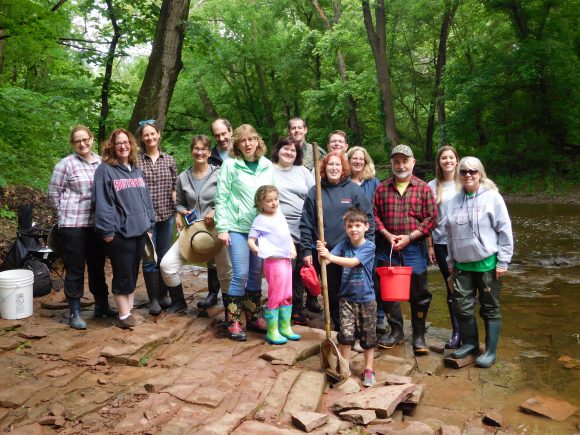
Rutgers Environmental Stewards learn the science underlying key environmental issues in the Garden State.
Imagine being able to discuss climate change with the State Climatologist or learn about New Jersey’s Geology from the people who map it. How about learning about habitat restoration in your own community or helping improve water quality of a local river or stream? These are some of the opportunities available to enrollees in the 2017 Rutgers Environmental Steward Training Program.
Rutgers Cooperative Extension will offer the Environmental Stewards Program at five different locations across the state – Passaic, Somerset, Middlesex, and Atlantic Counties, and once again in Burlington County. The Program has not run in Burlington County in quite a few years and will begin September 6, 2017 and run through January 2018. Classes will be every Wednesday evening from 6-9 PM at the Burlington County Institute of Technology (BCIT) Westhampton Campus.
The Rutgers Environmental Stewards (RES) Program educates the public about the science behind pressing environmental issues and helps participants create positive change in their communities. Stewards start out by attending class once a week on topics including climate change, soil health, energy conservation, water resource protection, invasive species management, open space management, habitat conservation, and environmental policy. Optional fieldtrips to environmentally significant sites around the state are included as part of the program.
Anyone can become an Environmental Steward. The program introduces non-scientists to the science underlying key environmental issues in the Garden State. Leading authorities from academia are joined by colleagues from government and the non-profit sector to share understanding and insights with the Stewards and help them make a difference in their own communities.
“Stewards have used this training as a stepping stone for further involvement in environmental work in their community,” said Pat Rector, state coordinator for the Environmental Steward Program. “Close to 40% of our alumni serve on a local board or commission and for many, that service is a direct result of having participated in our program.”
In order to become a certified Environmental Steward, graduates of the class portion of the program complete a 60-hour volunteer internship of their choosing. Internships are unique and intended to align with the passion of the individual, the needs of the program, and the community.
Steward internship project have included helping farmers adapt to climate change, composting restaurant food waste, mapping and eradicating invasive species in local parks, restoring native dune vegetation in shore communities, and creating rain gardens, among others.
The classes, fieldtrips, and internship does not replace a science degree, but helps citizens educate themselves when presented with a real world environmental problem. Students are introduced to a network of expert individuals and organizations who can be of service to them in the future as they wrestle with solving local environmental problems.
To register for the Burlington County class please contact Pat Rector-Woods at rector@njaes.rutgers.edu
Rutgers Cooperative Extension educational programs are offered to all without regard to race, religion, color, age, national origin, gender, sexual orientation, or disability.

